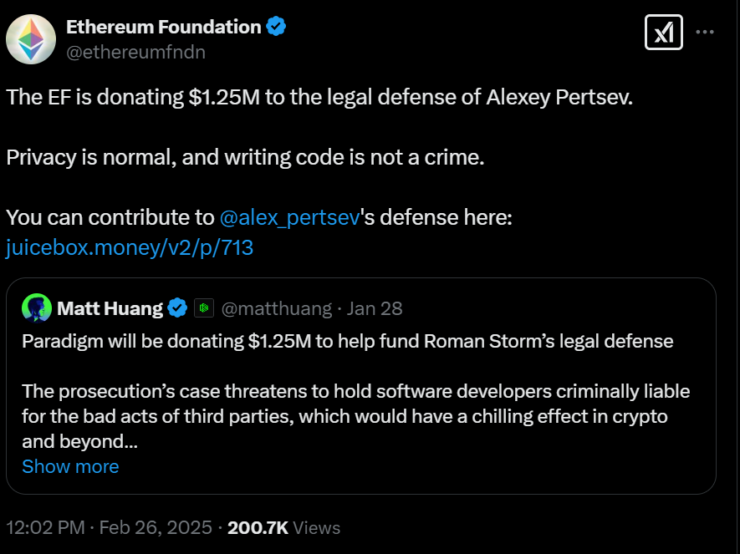The Ethereum Foundation has committed $1.25 million to support the legal defense of Tornado Cash developer Alexey Pertsev, reigniting debates on privacy, decentralization, and regulatory overreach in the crypto space.
The Ethereum Foundation (EF) has made a significant move in the ongoing legal battle surrounding Tornado Cash, donating $1.25 million to support developer Alexey Pertsev as he prepares to appeal his money laundering conviction in the Netherlands.
“Privacy is normal, and writing code is not a crime,” the Ethereum Foundation stated in a Feb. 26 X post, reinforcing the broader ideological struggle between crypto privacy advocates and regulatory authorities.

Pertsev responded by reposting the EF’s announcement, expressing his gratitude for the financial support toward his legal defense.
“I’m very grateful that I can now completely focus on preparing my appeal. This means the world to me,” he wrote.
Pertsev’s Legal Battle and Tornado Cash Crackdown
The Ethereum developer was arrested in August 2022 by Dutch authorities as part of a broader crackdown on Tornado Cash, an Ethereum-based privacy mixer that allows users to obscure transaction histories. Regulators alleged that Tornado Cash was widely used for illicit financial activities, including money laundering and sanctions evasion.
In May 2024, a Dutch court found Pertsev guilty of money laundering and sentenced him to five years and four months in prison. However, his legal team has since been preparing an appeal, arguing that writing open-source code should not be considered a crime.
In early February 2025, Pertsev was released from prison custody under pretrial conditions, marking a significant shift in the case as he awaits further proceedings.
Crypto Community Reacts to Ethereum Foundation’s Support
The Ethereum Foundation’s donation has sparked renewed debate about the role of privacy tools in blockchain technology and the increasing scrutiny from global regulators.
Crypto privacy advocates argue that Tornado Cash is merely a tool, not an illicit enterprise, and that developers should not be held responsible for how their code is used. On the other hand, regulators maintain that such privacy protocols facilitate financial crimes by making transactions harder to track.
This legal battle has broader implications for the crypto industry, with many in the Ethereum ecosystem seeing the case as a litmus test for the future of open-source development and decentralized finance (DeFi) regulation.
What’s Next?
As Pertsev prepares for his appeal, the Ethereum Foundation’s backing could set a precedent for how the crypto community responds to legal challenges against developers working on privacy-enhancing technologies.
With the case unfolding in the Netherlands, the verdict could influence how other governments regulate blockchain privacy tools, shaping the future of DeFi and digital asset security.
The Ethereum Foundation’s stance underscores the ongoing battle between innovation and regulation, raising the question: Can blockchain privacy coexist with regulatory frameworks, or will developers face increasing legal risks for building decentralized tools?





